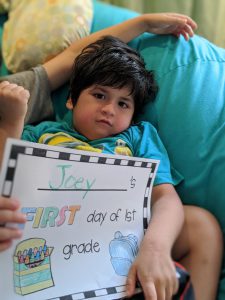 There are times when dire circumstances lead to the best ingenuity and creativity. After all, isn’t necessity the mother of invention? This fall, Joey’s Foundation is introducing a new inclusive learning opportunity to support Joey and children like him in maintaining their use of AAC despite virtual instruction.
There are times when dire circumstances lead to the best ingenuity and creativity. After all, isn’t necessity the mother of invention? This fall, Joey’s Foundation is introducing a new inclusive learning opportunity to support Joey and children like him in maintaining their use of AAC despite virtual instruction.
By the time this post is published, Joey will have had his first week of on-line first grade learning. And, just like all parents and advocates of rising first graders, we spent the summer wondering exactly how this virtual school is going to go. There will be aspects of virtual school that will work even better for Joey than when schools are open in person… and then there will be aspects of virtual first grade that are difficult to juggle. (As a former first grade teacher I bow down to all of you virtual first grader teachers out there preparing to keep this energetic, talkative and excitable age group engaged on a screen all day.)

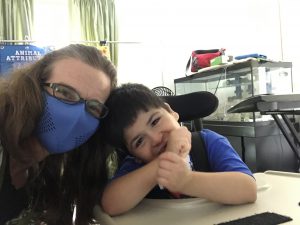 On July 6th, after last seeing Joey in the beginning of March, I was finally able to meet with Joey in person. As I walked up his driveway I found myself apprehensive about what I was going to find when we got to work. We had been working so hard during the winter months – tackling those early kindergarten skills of learning high frequency words, counting, phonemic awareness activities, and using his AAC eye gaze device to share his jokes, thoughts, and ideas.
On July 6th, after last seeing Joey in the beginning of March, I was finally able to meet with Joey in person. As I walked up his driveway I found myself apprehensive about what I was going to find when we got to work. We had been working so hard during the winter months – tackling those early kindergarten skills of learning high frequency words, counting, phonemic awareness activities, and using his AAC eye gaze device to share his jokes, thoughts, and ideas. 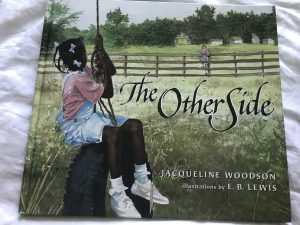 One of my favorite books to encourage children to discuss discrimination and racism is
One of my favorite books to encourage children to discuss discrimination and racism is 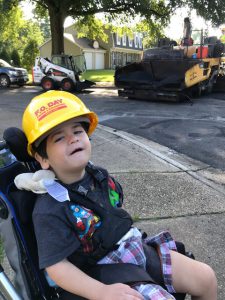 As our virtual learning school year has wrapped up in Northern Virginia, we are all left wondering what will be waiting for our students at the end of this summer “break”. The public schools are trying to figure out exactly how to walk the fine line between addressing a public health crisis while also maintaining high levels of instruction for children, and attempting to achieve programs that provide equity for all students. Truthfully, I am thankful I am not making the decisions. In the end, the decision made will inevitably leave many people frustrated. The truth is, there are no “right” decisions.
As our virtual learning school year has wrapped up in Northern Virginia, we are all left wondering what will be waiting for our students at the end of this summer “break”. The public schools are trying to figure out exactly how to walk the fine line between addressing a public health crisis while also maintaining high levels of instruction for children, and attempting to achieve programs that provide equity for all students. Truthfully, I am thankful I am not making the decisions. In the end, the decision made will inevitably leave many people frustrated. The truth is, there are no “right” decisions. 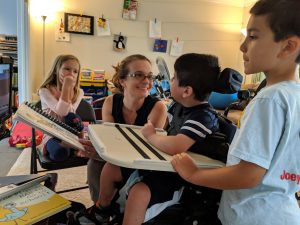 This past week I had the opportunity to listen in to AAC Learning webinar by Lauren Enders. It was chalk full of ideas, tips, and resources, and I am sure I will slowly reflect on them over time. The tips and ideas made me miss Joey and my work with him so much. I cannot wait to be back in person!
This past week I had the opportunity to listen in to AAC Learning webinar by Lauren Enders. It was chalk full of ideas, tips, and resources, and I am sure I will slowly reflect on them over time. The tips and ideas made me miss Joey and my work with him so much. I cannot wait to be back in person!
